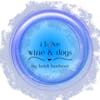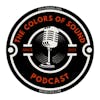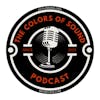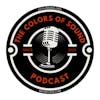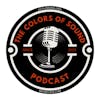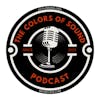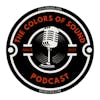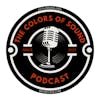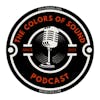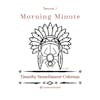
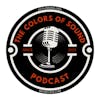
Over the summer of 2023, Coleman Global partnered with Sage USA to bring "The Colors of Sound" podcasting workshop to LGBT+ older adults in New York City. The intergenerational sessions focused on ‘Finding Your Point of View’ (POV) and the art of storytelling.

Title: "Labels; Who You Love"
Guests: The LGBTQ+ Older adults of SAGE USA
(disclaimer: Participants have changed their names for safety reasons)
Over the summer of 2023, Coleman Global partnered with Sage USA to bring "The Colors of Sound" podcasting workshop to LGBT+ older adults in New York City. The intergenerational sessions focused on ‘Finding Your Point of View’ (POV) and the art of storytelling.
https://www.facebook.com/SAGEUSA
@ColemanGlobal, @SAGEUSA, @sageusa-lgbtq, @jpmorgan
#TakeBackMonday, #Purpose, #Service, #Community, #People, #InnerCircle, #QuoteOfTheDay, #community-service, #bronx, #smallbusiness, #newyork, #black, #positivevibes, #learning, #workshop, #intergenerational, #podcasting, #LiveBrave, #intergenerationalprogramming, #technology, #LifeLearner, #ColemanGlobal, #LGBTQ+
--- Send in a voice message: https://podcasters.spotify.com/pod/show/colemanglobal/message Support this podcast: https://podcasters.spotify.com/pod/show/colemanglobal/support
In a world where so many things are vying for your time, I just wanted to say, Thank You for your attention.
In Unity,
Timothy
The Colors of Sound.
Intergenerational Programming
Topic: LABELS
Recorded: August 9, 2023
(Disclaimer: Participants have changed their names for safety reasons)
WDON1204.com is proud to present our latest podcast, The Colors of Sound. Our mission is to create a safe space for community members from around the world to share their personal stories. Listen on all streaming platforms or on our podcast station wdon1204.com.
The Colors of Sound podcast. Discover how much we have in common.
Over the summer of 2023, Coleman Global partnered with Sage USA to bring The Colors of Sound podcasting workshop to LGBT+ older adults in New York City. The intergenerational sessions focused on ‘Finding Your Point of View’ (POV) and the art of storytelling.
Each week, participants crafted their own topics for discussion, developed their own questions to help move the conversations along, spoke about podcasting equipment, and had brief discussions on how to market podcasts online. Throughout the workshop series, the participants shared their personal stories of both struggle and of triumph. We laughed about the things that are common in society and debated those things that divide our global community.
Welcome to “The Colors of Sound Podcast”. You are now a part of the conversation.
Yes, hi, good morning. This is “Laverne”. Our topic for today is, “Label; Who You Love”.
What are some of the labels that you have individually been given in your lifetime?
Well, "You lesbian". I've heard, "You Dyke". That's about it. And I don't like the labels. Because I am who I am. And that's “Laverne”.
Alright, and what are some of the other labels? There could be, you know, like, more accepted terms. Like mom, sister, brother, nephew, cousin.
So when we're, like, speaking on labels, are we going more into, like, the generalized gay society labels? Or are we doing, like, the actual... There's more gay labels than, like, I guess you could say, we abide by, as, like, the youth. Like, for instance, there's Butch Queen, there's Butches, there's Film Queens, there's all kinds of different sorts of labels for different parts of the community.
Generally, like, when I first entered the ballroom community, I was labeled a butch queen. I didn't know what a butch queen was. But a butch queen is supposed to be a male that acts feminine and shows flamboyance in it.
So then you learn that there's another label called "trade". And "trade" is a man that's on the DL, which is “Down Low” or “undercover” and he does not want the world to know his truth.
And so like, for me, I don't know, I was a butch queen, but I don't even consider myself a butch queen no more. Like, I just be chillin now, so like, I'm in the mid spectrum because I don't really deal with all the extra labels and how they associate you with each one of these labels and, yeah.
But what was one of the first things that, what was one of your first responses when someone gave you a label that you were unfamiliar with?
What are the expectations of that label, more so? Because I didn't know what a butch queen was. So therefore, like, me getting called a butch queen, I had to do my research. And so, like, I'm finding out, like, you know, butch queens are like the glam of being gay. Like, they're the very flamboyant ones. So, like, for a whole year and a half, I lived up to the full potential of a butch queen.
So you took on
Yeah.
You took on the characteristics of the title that was given to you.
Yes.
But now you don't.
I don't do it no more.
Okay.
So you were accepting of that term? You liked it?
Yeah, I accepted it because when coming to New York, I had this idea of like, I can recreate who I am. And so, that was an idea for me rather than an actual personality of me. I was just in the works of finding out who.
That's interesting. Anybody else?
My label, um, I'm considered a femme in the lesbian community because, um, you know, that's just what I am. I mean, I don't, I, I'm just me. I mean, cause they have, in the lesbian community, they have the “aggressives” and the femmes, you know. And, okay, so I'm not aggressive, but I can be. Um. Um, but then a lot of the people that, the women that I'm attracted to are masculine identifying. So I am not attracted to a feminine female. So in the, in the, in the relationship, I'm a feminine female with the nails and the hair and the, you know, but I'm not what you call, because I don't wear, um, I don't wear heels and skirts and makeup and all that other stuff that's not me. But, um. In the, in the lesbian community, there's femme and there's the butch.
So when I first moved to New York, uh, one of the things that, that, one of the labels that I heard about within the lesbian community was that you have lipstick lesbians, right? Which sounds like what you just described, but a much, no, no, no, no, I'm not saying I agree with it. No, this is just what I heard. True or not. You know what I'm saying? Like, accept it or not. Like, that's, again, that's like a label that someone created out of, I don't know where it even came from. Um, have you ever been called that? Was that ever...
No. No.
I'm saying that it's not, is that, was that never really a thing?
Oh, yeah.
No, it is a thing.
But, our lipstick lesbian definition is a person who is masculine, but undercover. And they wear the lipstick, and they, you know, present the hair, they present a certain way. And, a lot of it is because of, you know, societal, um, norms, profession that they may be in. So they, you know, dress androgynous, or, you know, with lipstick. You know, the whole works.
I have a different, um, take on it. First of all, I identify myself as being a big, black, beautiful, bohemian, bougie, Buddhist butch. That's number one. Number two, uh, a lipstick lesbian to me, um, is a very old term. Archaic. And it pretty much means straight-looking, straight-acting.
Okay.
So you're undercover, definitely undercover. Um, and I think that with the butch femme phenomenon, it's more in the black community. Whereas in the white community, the couples who are lesbian look very androgynous. You can't tell who the butch is, who the femme is. And two butches coming together in the black community is rare. It happens, but it's rare. Um, and I want to switch gears real quick to Wayne Brady, ID'ing as pansexual. I remember going to a seminar and everyone was around and everyone was saying who they were. And The white, this young white man was saying, I'm queer. And I thought, well, that was a word I wasn't going to be using again in my life. Um, and then this very young, pretty Asian woman said, I'm pansexual. And I'm there with Marie and I'm like, I know you can't see me because I'm on the radio, but I'm mouthing, “what's that?” To him, he could, the quote is, "I took pan to mean that not only can I be attracted to any of these people, or types, physically, but I could be attracted to the person that is there". And I just think that's very powerful.
Pansexual is just a very, like, I don't know, so like, it's very hard to like, identify as pansexual, I believe. Um, due to the fact like, I've dated trans, I've dated a lot of different breeds of people and humans. And so like a lot of people will say I'm pansexual due to like my choices of relationships, but like, But that's not a that's not a label you accept I mean, I just don't know what label to accept because one day I'm bisexual the next day I'm gay the next day I'm pansexual. It's just all on the occurrence of that person into them within that moment.
So, I think that also takes us to a bigger conversation of who are the people in the Air-conditioned offices that we never see, who are making up all of these labels and titles for everybody else, like why, why, why are we even allowing that?
Exactly. Cisgenders. That label, oh, I don't know, it just, it doesn't sit right with me.
Cisgenders. That's women, right?
Well, that cisgender basically means your, your identity matches your biology. That's all it means. So you can be straight and be cisgender. You can be gay and be cisgender.
What's normal?
Normal is a setting on a washing machine.
Exactly.
We define normal.
You know what I'm saying?
Why are we letting these people define us?
Well, and that's why we create our own labels as well. Like, for instance, Y'all have what y'all call “Lipsticks Lesbians”, this, that, the next. We don't know nothing about that in the gay world. But that's how y'all would identify or you know, try to like get a world idea of that person without having to say, oh, this is exactly what they are. For instance, in the ballroom community, they refer to me as a butch queen. And it's not just to be like, Oh, he's just a flamboyant little boy. It's just to be like, Oh, he does this, he does this. It's just more of a stereotype to get an idea of how to move around in person.
In the gay community, they have something called men having sex with men. And that's for men who don't want to identify as gay, but they're having sex with men. And that's the title that he was talking about. So, they don't want the stereotypes.
Yeah, it's like okay, that's what we call a trade. It's a man who has sex with men.
Or men on the down low, they're straight guys. That's what he, yeah.
Yeah, so those men, that's how we would identify them. We don't call them DLs no more because that's too obvious. We call them trades. Cuz that's more like, they're trading in at night. Like, it's no, like, you're a man during the day and you're gonna trade in into your... You're queen.
I feel like when I was growing up, trade was, trade was something totally bad. Thank you.
Trade was a trick. Trade was a person who was selling themselves. That's what trade we know.
That's, we know it kind of, it kind of kind of stands for that.
It was like the gay for pay.
Or, for "Gay for the State" when you're institutionalized. Yeah. So if you're in prison, your sex, your sex drive doesn't stop. So how do you get satisfied when you only have one gender in the Prison? In the prison, it’s “Gay for the state”, right.
And, “Gay for the State”. Because in prison a lot of times you don't have a choice. And, and, and when I see these young people portraying that label, I think of prison.
I don't know if you would pull five people off the street who have their pants underneath their butt, like, if they would all tell you it means the same thing.
Well, see, that's the thing now in high fashion. GAG!, there's actual pants now made with boxes seamed into them to make it look like you're saying. Get out! Get out! Like high fashion, like two thousand, three thousand dollar pants.
Because Calvin Klein... Had put out a long time ago, right, and being able to see the name of underwear while your pants are still pulled up was different than now you have to see like the whole everything that's going down.
Because it's a print! It's a pattern! It's a staple! It's an icon!
Yeah, but why? Because when it's talking about fashion, there's reasons for it. Like I'm not finna go buy pants that I done had, you know, I'm not finna go buy pants that's already ripped up y'all. That's late. That's crazy. That's $40 a pant.
When I have jeans already that I really, you know, find a fit and I want them to be worn. I want them to be cut up. I want them to be fast, you know, cause the nowadays fashion is not about the look. It's about the labor. Yeah. Us designers now are more looking at, okay, yeah, I can make a pair of pants in 20 minutes, but what can I do with the pair of pants?
And so, like now that distressed jeans, that designer has taken them jeans and went to hell and back just to create a simple rip. And so, it was just about like, you know, tagging and stuff. It's about the creation. Like me and four friends, since we made a pair of fab jeans, y'all will gag because the jeans look like they're sagging.
But the jeans are made with another pair of jeans underneath the jeans to create the illusion of them sagging, but they're not sagging for real.
I saw a pair of pants like that, but they were two different, two different ways, two different pairs of, I saw a pair of pants like that.
So, it's just the style and like the work that goes into it, and it's just a greater appreciation for the work afterwards.
The Mission of SAGE
SAGE leads in addressing issues related to lesbian, gay, bisexual, transgender, queer and questioning, and other self-identifying members of the community aging. In partnership with its constituents and allies, Sage works to achieve a high quality of life for LGBTQ plus older people, supports and advocates for their rights, fosters a greater understanding of aging in all communities, and promotes positive images of LGBTQ plus life in later years.
Back to the conversation…
No, if, if, if you talk to me on the phone, Oh, you think I'm white? I used to be a psychiatric crisis worker. And after I did the assessment for level of care, it was time to get that person in full point restraints if they needed that. And they would be sent to the state hospital. And so the person at the end was an ambulance worker.
Oh, he's a big black man. How much does he weigh? Oh, he's big and black. Oh, you know what that means, don't you? I said, Oh, really? You do realize you're talking to a black person right now. Oops. So you can't tell someone's race over the phone. That's a label. Not always. I used to get that all the time. Not always.
Yeah, no, that's it. Cause they know I'm black.
So what about, what was okay. It was just like, cause I was raised in like, uh, like a really country area. And I remember one time calling my mom's job to ask her, you know, when she, when she come in the home or whatever. And then they told my mom that there was a white man after her on the phone.
Oh my gosh. That was like the funniest experience ever. But, yeah. And it's her own son. Yeah. I was like, I remember one time I was in a car. And I was in Winter Haven at the time. And this, the driver was like, oh you speak very proper. What an insult. You speak very well. I was like, wait a minute. What am I not supposed to speak well?
Like, what am I supposed to come up in the car like, what's that? Like, you know, I'm like, I can definitely do that as well. But. Baby in the car, you know what I'm saying? It's just it was very weird. Like that whole experience over there was weird. I'm so happy I moved.
Has anybody else ever been made to feel That being told you're articulate is a compliment?
Yeah.
I mean, I think it's different, like, for us, like, especially being bi-racial. There's many, like. They're like, we're expected to sound like, or, you know, so like for us at the very beginning, I guess we did talk really white, really soft. Like, yes, ma'am. I would definitely go there. You know, like you do have that, but then like when my mom did not like us to do that, but my mom was a white mother.
So she knew that like, that's not like how we, we did, it was unseasoned, literally like unseasoned kids. And so like, you know, she did take us out of like the little suburbs and, you know, put us in the projects for a couple of years just to give us, you know, that little like culture. And like, it's when we went back to the farm and we started to be like, hey man, what's good with you?
You know, we started talking like that. And the jaws would drop. So you said something that was really, I mean, a lot of that is funny, but you said, uh, we were unseasoned.
Yes. Right?
Like, that's another episode in and of itself, but it does fit in terms of labels. You're saying unseasoned, and then you were moved into the projects.
Yes. Cause like, for us, like, it's Memphis, y'all. Like, there's only country. Projects. If you can go to Germantown, find you a little good doctor areas, but that's the only place. So like, if you live in a farm, it's predominantly white. All the black kids go to a public school. All the white kids go to a private school.
It's dead segregated like that. Nobody mixes. You know, I'm one of the brightest people at my high school. So like, that just like for us, I don't know, the integration of trying to understand. Our place and like how like they would perceive us. It's just very hard. So like you just gotta figure out what environment I gotta speak in.
So black English and white English. So there was an article and it was talking about how Berkeley had a school system. That was teaching black English so that when they were teaching English, the kids could understand that certainly there was validity to black English. And let's use that to have a foundation to learn another kind of English.
And then the article went on to say, it's not about black English. It's not about white English. It's about green English. What is the kind of English that's going to help make you money? Now every other culture in this, on this planet, you have the King's English and then you talk Cockney when you go home.
So when you have a job, you're going to speak the Queen's English, but back in the neighborhood, you speak a different kind of English if you are living in the UK. So why can't that be here? And we do it. A lot of us are bi, are bilingual. We do it all the time. We've talked about a lot of different things.
So what are some of your final thoughts after this conversation? Where can we find commonality in society and how we function?
I feel like labels are structured but should not be applied. But we shouldn't hold on to them so tight. That we don't allow a person to be who they genuinely are. Right.
Yeah, we don't want to stop their growth. Right. Right. Okay. And put someone else in a box because that makes us feel more comfortable. Mm hmm. Okay.
I think labels are just dumb. They want to put us here, put us there. Let us be us. Grow. Like a plant. Like children, like last week. Put a group of kids in a park. They get along.
If you try to put me in a box, I'm gonna continue. To, uh, morph into my evolutionary fractal self because I'm still growing. I am not invisible. I am someone who will not be limited. As my friend Star has so eloquently put, but I do think that being who I am is something that I'm proud of, and pride, we have our flags and we talk about our family, but I think that it can be a double-edged sword.
Closing:
Share your story on the Colors of Sound podcast! Our mission is to create a safe space for community members from around the world to share their unique stories. Do you have an interesting story to share? Or perhaps a journey of triumph from a challenge that you faced? Do you want the world to know about your talent?
Visit our website and complete our guest intake form at
wdon1204.com.
The Colors of Sound Podcast. Discover how much we have in common.
Featured Episodes
Check out the latest podcast episodes from our channel.









